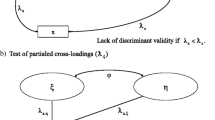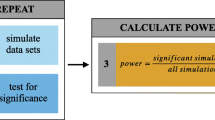Abstract
We develop the general conceptual, mathematical and statistical foundations of behavioral social choice for scoring rules. Traditional scoring rules are difficult to assess empirically because one rarely observes the deterministic complete linear orders that they require as input. We provide a general concept of scoring rules in terms of a broad range of mathematical representations of preference or utility, namely arbitrary finite binary relations, probability distributions over such relations, real valued multi-criteria utility vectors and real valued random utility representations. We extend Regenwetter et al.’s (Behavioral social choice. Cambridge University Press, Cambridge, 2006) statistical framework to a more general setting. We illustrate the general modeling and statistical tools by applying them to four well known sets of survey data. We illustrate two potential problems that have previously received little attention and that deserve systematic study in the future: (1) Scoring rule outcomes can suffer from model dependence in that the social welfare functions computed from ballot, survey, or hypothetical data may depend on implicit or explicit modeling assumptions. (2) Scoring rule outcomes may suffer from low statistical confidence in that the correct assessment of social orders from empirical data can be far from certain. We also illustrate the empirical congruence among conceptually competing social choice methods.
Similar content being viewed by others
References
Arrow KJ (1951) Social choice and individual values. Wiley, New York
Block HD, Marschak J (1960) Random orderings and stochastic theories of responses. In: Olkin I, Ghurye S, Hoeffding H, Madow W, Mann H (eds) Contributions to probability and statistics. Stanford University Press, Stanford, pp 97–132
Chamberlin JR, Cohen JL, Coombs CH (1984) Social choice observed: Five presidential elections of the American Psychological Association. J Politics 46:479–502
Dobra J (1983) An approach to empirical studies of voting paradoxes: an update and extension. Public Choice 41:241–250
Feld SL, Grofman B (1986) On the possibility of faithfully representative committees. Am Poli Sci Rev 80:863–879
Feld SL, Grofman B (1988) Ideological consistency as a collective phenomenon. Am Polit Sci Rev 83:773–788
Fishburn PC (1985) Interval orders and interval graphs. Wiley, New York
Gilovich T, Griffin D, Kahneman D (eds) (2002) Heuristics and biases: the psychology of intuitive judgment. Cambridge University Press, New York
Harary F (1969) Graph theory. Addison-Wesley, Reading
Kahneman D, Slovic P, Tversky A (1982) Judgment under uncertainty: heuristics and biases. Cambridge University Press, Cambridge
Kahneman D, Tversky A (1979) Prospect theory: An analysis of decision under risk. Econometrica 47:263–291
Kahneman D, Tversky A (eds) (2000) Choices, values, and frames. Cambridge University Press, New York
Luce RD (1956) Semiorders and a theory of utility discrimination. Econometrica 26:178–191
Luce RD (2000) Utility of gains and losses: measurement-theoretical and experimental approaches. Erlbaum, Mahwah
Marchant T (2000) Does the Borda rule provide more than a ranking? Social Choice Welf 17:381–391
Mueller DC (2003) Public choice III. Cambridge University Press, Cambridge
Niederée R, Heyer D (1997) Generalized random utility models and the representational theory of measurement: a conceptual link. In: Marley AAJ (ed) Choice, decision and measurement: essays in honor of R. Duncan Luce. Lawrence Erlbaum, Mahwah, pp 155–189
Regenwetter M, Grofman B, Marley AAJ, Tsetlin I (2006) Behavioral social choice. Cambridge University Press, Cambridge
Regenwetter M, Kim A, Kantor A, Ho M-H (in press) The unexpected empirical consensus among consensus methods. Psychol. Sci.
Regenwetter M, Rykhlevskaia E (2004) On the (numerical) ranking associated with any finite binary relation. J Math Psychol 48:239–246
Regenwetter M, Tsetlin I (2004) Approval voting and positional voting methods: inference, relationship, examples. Social Choice Welf 22:539–566
Riker WH (1982) Liberalism against populism. W. H. Freeman, San Fransisco
Roberts FS (1979) Measurement theory. Addison-Wesley, London
Saari DG (1995) Basic geometry of voting. Springer, Berlin Heidelberg New York
Saari DG (2001) Chaotic elections! a mathematician looks at voting. American Mathematical Society
Sapiro V, Rosenstone SJ, Miller WE (1998) American national election studies, 1948–1997. Inter-university Consortium for Political and Social Research, Ann Arbor
Tullock G (1981) Why so much stability? Public Choice 37(2):189–202
Young HP (1974) An axiomatization of Borda’s rule. J Econ Theory 9:43–52
Author information
Authors and Affiliations
Corresponding author
Rights and permissions
About this article
Cite this article
Regenwetter, M., Rykhlevskaia, E. A general concept of scoring rules: general definitions, statistical inference, and empirical illustrations. Soc Choice Welfare 29, 211–228 (2007). https://doi.org/10.1007/s00355-006-0204-1
Received:
Accepted:
Published:
Issue Date:
DOI: https://doi.org/10.1007/s00355-006-0204-1




